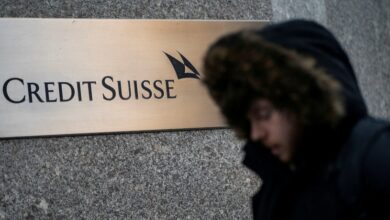Credit Suisse triggers new earthquake
The banking crisis continues to smolder and has claimed its next victim: securities of the crisis-ridden Credit Suisse collapse in double digits. In their wake, bank shares are tumbling across Europe.

The papers of the crisis-plagued Credit Suisse have collapsed by almost 24 percent today. They fell to a record low of just under CHF 1.707. Investors fled after the Saudi major shareholder Saudi National Bank announced that it could not provide the major Swiss bank with any further money because regulatory reasons limited the stake to ten percent. The major shareholder said at the same time that he was sure that Credit Suisse did not need any additional money.
Loan default insurance prices are skyrocketing
But this appeasement did not convince investors. This is also reflected in the price of the bank’s default protection for bonds: five-year credit default swaps (CDS) for debt instruments soared to 574 basis points.
The Swiss National Bank (SNB) declined to comment on the situation at Credit Suisse after the price crash. However, the price slump repeatedly led to a trading stop for the shares of the big bank on the Swiss stock exchange SIX. A suspension of stock exchange trading was not requested, a SIX spokesman said on request: “That is not the case.”
Is Credit Suisse the next shaky candidate?
The high volume of trading in CS shares is particularly significant: by midday, almost four times as many Credit Suisse stocks changed hands as on an average day as a whole. The bank has lost 36 percent of its value since the steep slide began on Monday last week.
It looks like more and more concerned investors and counterparties are eyeing Credit Suisse as a possible next shaky candidate, said Neil Wilson, market analyst at Onlinebroker Markets.com. “When Credit Suisse runs into serious existential difficulties, we’re in a whole different world of pain. It really is too big to fail.”
Bank stocks in the Credit Suisse sog
The crash was initially driven by concerns that the shockwaves on the financial markets triggered by the collapse of California’s Silicon Valley Bank (SVB) could affect the already weakened Credit Suisse. Then today came the comments of the Saudi National Bank, they were the notorious straw that broke the camel’s back.
The fall in the price of Credit Suisse shares also dragged down the stocks of other European banks. Commerzbank shares fell by more than nine percent at the top. Deutsche Bank was also one of the bottom performers in the DAX with a drop of around eight percent. The European banking index lost more than six percent.
Safe havens are in demand
On the other hand, safe havens such as the US dollar and yen, as well as gold and bonds, are in demand. The trend-setting futures contract Euro-Bund-Future recently rose sharply by 1.8 percent to 136.40 points. In return, the yield on ten-year Bunds fell significantly to 2.25 percent. Bonds from other euro countries such as France and Italy also increased significantly in price.
After the collapse of the SVB and another US bank last week, regulators and financial managers around the world scrambled to allay investors’ fears of contagion and a widespread banking crisis. But the fall in the Credit Suisse share price is now nullifying these efforts for the time being, and investors are extremely nervous.
What is the ECB doing?
The forthcoming interest rate decision by the European Central Bank (ECB) is causing additional nervousness on the markets. If it sticks to its plan to raise key interest rates significantly, this could cause unrest again. After all, it was the US Federal Reserve’s vigorous rate hikes that made credit in the US more expensive. As a result, debtors could not pay their installments, which ultimately led to the bankruptcy of the Silicon Valley Bank. An all too clear signal from Frankfurt could cause further trouble on the markets.



